AI in email marketing refers to a series of machine learning algorithms and artificial intelligence technologies that optimize the effectiveness of email marketing campaigns in various aspects, such as content production, interactive layout, coding, among others.
With AI, it is also possible to analyze large volumes of data in search of insights for smarter personalization, analysis of behavioural trends, suggestions for automation flows and creative assistance in repetitive tasks.
We are far from the apex of this technology. We will certainly see many more evolutionary phases in this movement. The current moment, which we could call the first AI revolution in email marketing, already brings a large number of benefits, both for marketers and for the results achieved by campaigns.
But in practical terms, how can AI in email marketing help and definitely be applied in your day-to-day practice? That’s what we’re going to see in this SafetyMails article.

Table of Contents
- How AI is enhancing email marketing
- Benefits of AI for email marketing strategy
- Cautions, challenges and considerations about AI in Email Marketing
- Practical applications of AI in Email Marketing
- The role of the digital marketer in the age of AI
- List of AI Tools for Email Marketing
- Automating email verification
- Conclusion
- FAQ
How AI is enhancing email marketing
In simple terms, we can say that AI is transforming the email marketing market as a whole, especially in 3 aspects:
- Technical adaptation: the use of artificial intelligence resources is allowing email marketing platforms to offer increasingly complete functionalities, enabling more refined levels of performance.
- Speed and intelligence: with a multitude of resources available for generating texts, layouts, images, analysis and insights based on machine learning and artificial intelligence, planning and executing email marketing campaigns (from the simplest to the most complex) is becoming an increasingly faster and smarter task, allowing for actions that are more appropriate to the movement and momentum of the market and consumers.
- Professional adaptation: this transformation also affects digital marketing professionals, as they need to update their knowledge in order to use, understand and get the most out of AI tools and platforms, reconciling human and artificial potential to obtain better results more quickly and efficiently.
Benefits of AI for email marketing strategy
A comprehensive overview of the use of AI in email marketing reveals a profound impact, transforming the way marketers engage with their work and optimize their campaigns.
Operational efficiency
Automating tasks such as list segmentation, content generation and response handling greatly reduces the time and effort required to manage email campaigns. It also allows more campaigns to be carried out within a shorter period of time, making processes more focused on increasingly well-segmented groups, leading to better results.
Improved engagement and conversion rates
With better-targeted campaigns, based on increasingly detailed, real-time reports and insights, it is possible to say that there will be an increase in engagement and conversion rates, leading to a higher ROI and a consequent reduction in costs associated with ineffective campaigns.
Real-time insights
AI is able to offer practical insights into various aspects, such as customer behavior, campaign performance, trend analysis, among others, allowing marketers more possibilities for data-based decision-making, refining their strategies.

Cautions, challenges and considerations about AI in Email Marketing
While the use of AI offers numerous benefits, it also presents some challenges:
- Privacy and Data Protection: the use of some tools raises concerns about privacy and data protection. Professionals must ensure that such platforms comply with regulations such as the GDPR, CCPA and LGPD, and that they adopt transparent data practices;
- Technical preparation of professionals: implementing artificial intelligence solutions requires a certain level of technical knowledge. Companies may also face resistance from professionals. It is therefore necessary to invest in training, raising awareness and hiring professionals trained in the use of AI tools.
- Ethical concerns: AI decision-making, if not properly monitored, interpreted and adapted by human professionals, can lead to ethical problems such as misuse of personal data (such as profiling) and copywriting violations.
Practical applications of AI in Email Marketing
We are going to demonstrate some of the practical applications of AI in Email Marketing, trying to give examples of its use and also indicating tools (paid or free) to put these ideas into practice.
Some possible applications include:
- Automated content creation
- Intelligent insights based on analysis and machine learning
- Intelligent segmentation
- Intelligent sending schedules
- Automated responses
- A/B testing
Next, we’ll try to dig deeper into each of these topics.
Personalizing content
AI-optimized email marketing applications are able to collaborate in the preparation of content and suggest personalizations and activations of emotional triggers very effectively.
In addition, they can collaborate in automations and recommendations of highly segmented offers.
Another benefit of AI in email marketing is associated with elements directly related to interactivity and engagement with the target audience.
For example, Landing Pages are important elements for email marketing (and sales and relationships in general) in that they are usually the main means of collecting email addresses, among other information. AI is already capable of monitoring behaviors and creating and altering landing pages based on those behaviors.
Creation of optimized subject lines
As we’ve seen in numerous SafetyMails articles, the subject line is a very important element in the success of email marketing campaigns, especially when it comes to engagement.
Email marketing tools with AI capabilities can automatically analyze historical data from previously sent campaigns, applying learning models to predict which subject lines are most likely to attract the attention of recipients to open the messages.
These analyses take into account factors such as the length of subject lines, the tone used, the use or not of emojis, keywords and elements capable of activating the best emotional triggers in recipients.
These tools can not only point out the best ways, but also suggest the wording of the subject lines themselves.
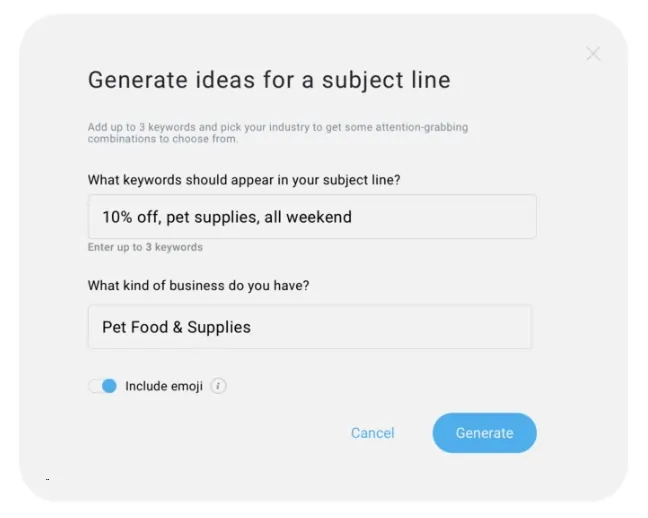
In a practical way: using AI in email marketing to create your subject line
Whether you’re using an email marketing platform with artificial intelligence features or platforms like ChatGPT, you’ll need to define some strategic elements beforehand.
So, go through the following checklist before proceeding to create your subject line:
- Define the purpose of the email: this email will be promotional (promoting something), sales (selling something), transactional (informing that some action has been carried out successfully or not) or informational (communicating something, as in a newsletter).
- Email offer: registration for an event, sale of a specific product, the most important news of the day, etc.
- Tone of the message: formal, informal, urgent, etc.
- Emojis: will you use emojis or not?
- Mental triggers: would you like to use any mental triggers? For example, scarcity, urgency, emotion, reciprocity, authority, etc.
- Personalization details: define whether any personalization will be used.
Vamos praticar, usando o ChatGPT?
Here we will use GPT Chat, but you can use the artificial intelligence of your choice.
Checklist notes:
- Purpose: information, newsletter.
- Offer: article on AI in email marketing.
- Message tone: informal.
- Emojis: yes, only 1.
- Mental trigger: credibility.
- Personalization details: none at the moment.
We used a prompt something like this: “Chat, I need 10 suggestions for subject lines for an email marketing campaign with an informational purpose, aiming to promote the blog article ‘The AI Revolution in Email Marketing’, with up to 70 characters, using an informal tone, with 1 emoji, taking advantage of the mental trigger of credibility, since our article has practical examples.”
The 10 suggestions received were:
- 🚀 Discover how AI is transforming email marketing today!
- 🤖 AI in email marketing: The future is here! Check it out!
- 🌟 AI revolution in email marketing! Don’t miss out!
- 📈 AI in email marketing: Insider tips and real examples!
- 💡 How AI is reshaping email marketing? Find out now!
- 🔍 AI + email marketing: Practical examples you need to see!
- 🎯 AI in email marketing: Proven strategies that work!
- 🚨 Don’t miss this: AI is changing email marketing!
- 🤩 See how AI is revolutionizing email marketing!
- 🎉 Email marketing with AI: Best practices you can trust!
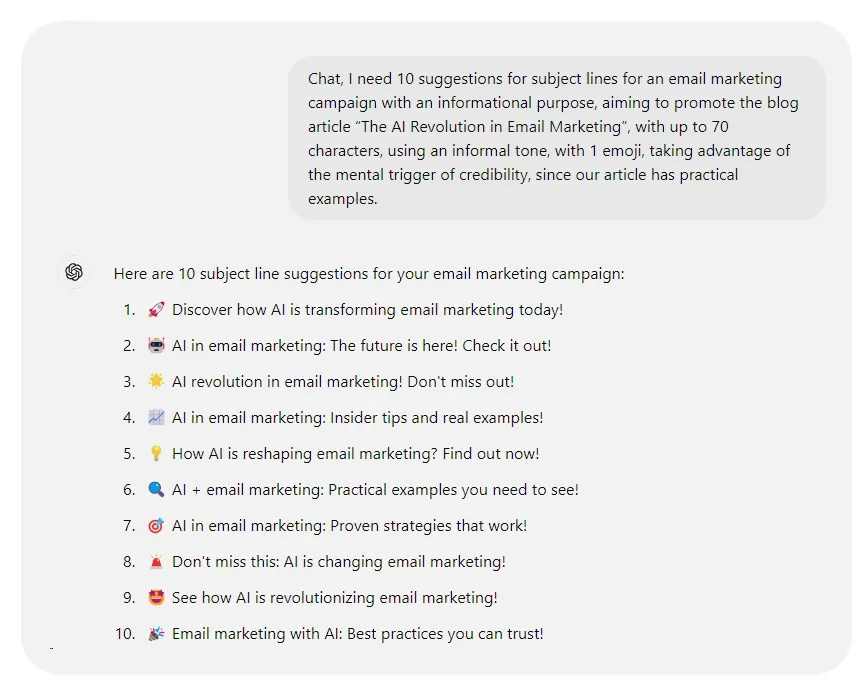
We particularly like the suggestions highlighted. You can do the same: when using a prompt to create subject lines, select some of the best suggestions given in the result and submit them to an A/B test, which will select the most suitable one.
Obviously, if your email marketing platform makes use of historical information and access to personalization, the suggestions will be even better!
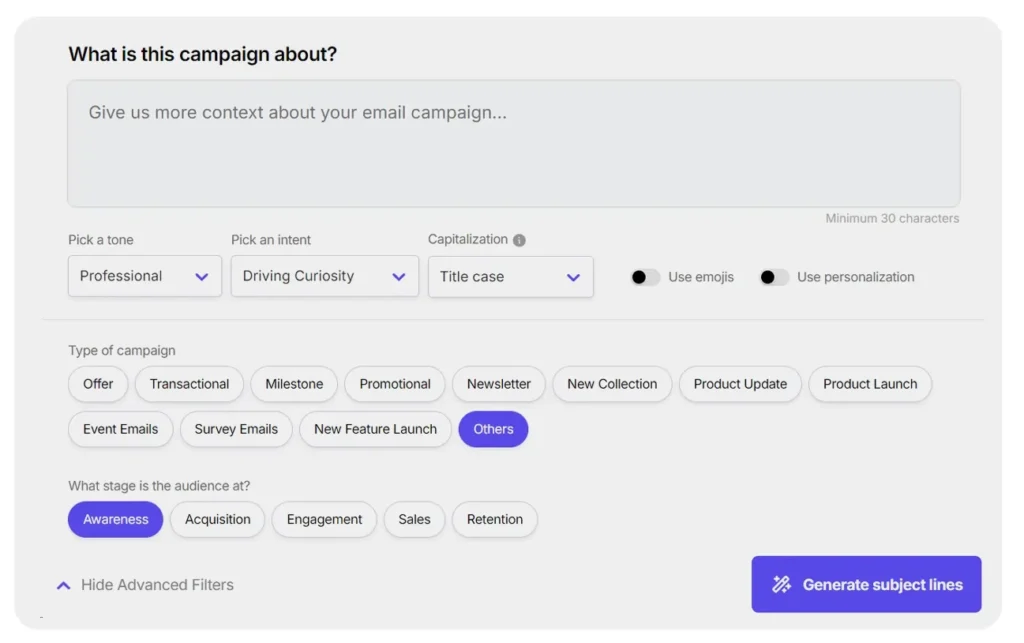
Automatic creation of layouts, texts and call-to-actions
The same dynamics used for the subject line can be used for the creative and textual production of the body of the email, as well as the call-to-action of the email marketing action.
And it’s clear that this type of functionality can save a lot of time.
For example, Mailmodo promises AI capabilities for creating email templates, using only elements such as email type, tone of speech and message length (longer, medium or shorter emails). In addition, it claims to be able to create, also with AI resources, interactive email campaigns with AMP email features in a few minutes. Sounds interesting.
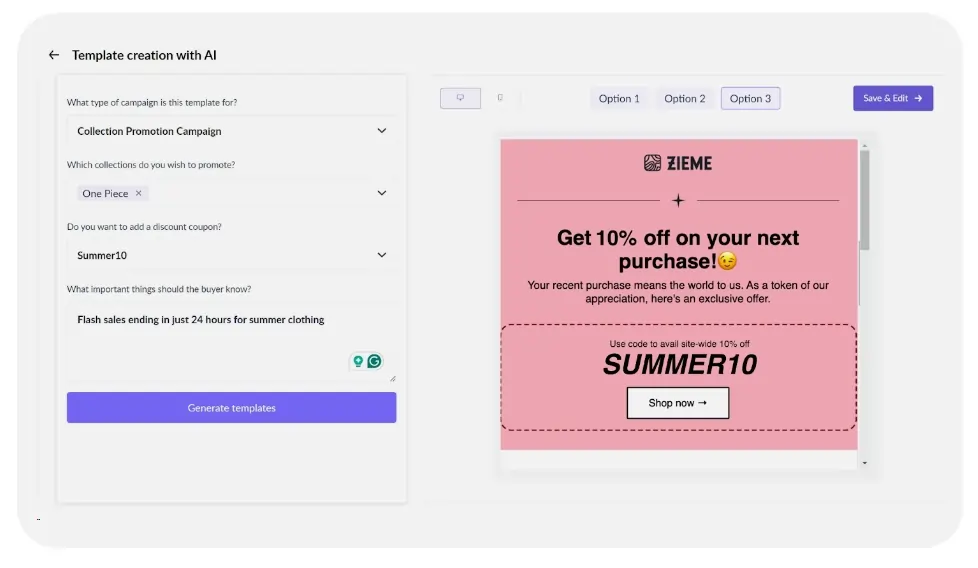
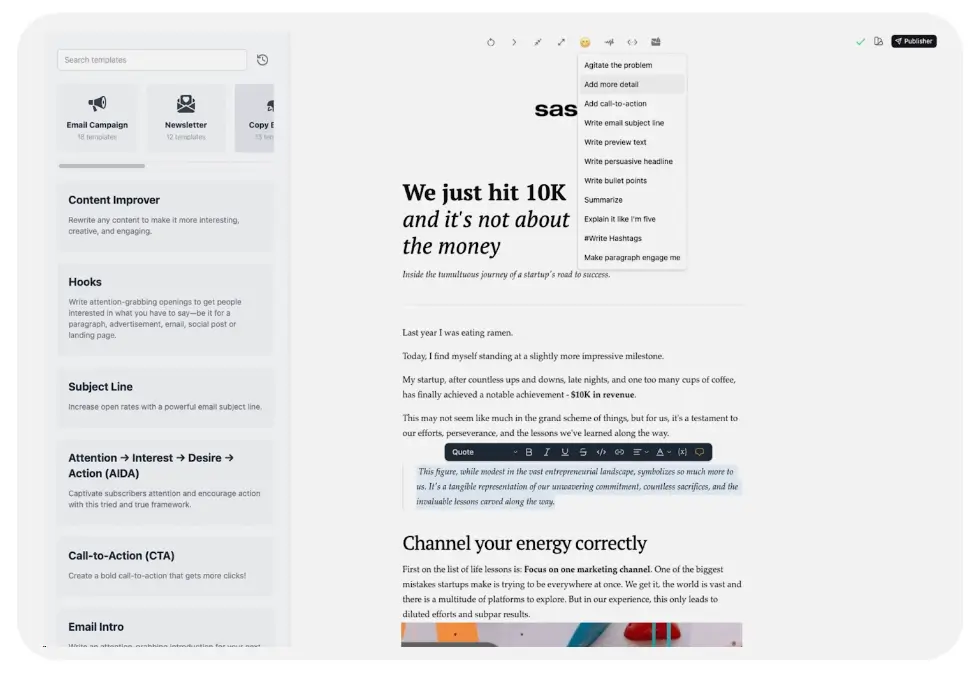
Workflow automation
The use of AI in email marketing goes far beyond suggesting content and creating images based on prompt instructions.
Artificial intelligence is also capable of helping to automate workflows and processes, easing the manual workload that marketers would have in the day-to-day management of their activities.
Intelligent audience segmentation
Email marketing and CRM platforms, among others, that rely on AI resources can automatically segment mailing lists based on various criteria, such as purchase history, browsing behavior and demographic data.
Obviously, a marketing professional or a statistician will be fully capable of generating segmentations of the same nature. The difference in segmentation when it comes to artificial intelligence is based on two characteristics: proactivity and speed.
- Proactivity: artificial intelligence can identify patterns and trends without the need for a direct command and automatically signal this to managers. In addition, the segmentation possibilities can range from voluminous clusters to micro-segmentation.
- Speed: the analysis of large volumes of data, for different purposes (segmentation for email, for sms, for activation and relationship actions, among others), can be done much more quickly.
Automated and intelligent responses
Artificial intelligence software can be implemented and trained to deal with simple question and answer routines, leaving more free time for marketers to deal with more strategic tasks.
Obviously, we’re not talking about chatbots with ready-made, robotic answers, but rather intelligence that has a deep understanding of terms of use, rules, routines, procedures, applicable legislation, the company’s tone of speech and everything else that is necessary for real engagement with senders.
In this way, AI can skillfully respond to email messages with the right tone and within the company’s best practices, directing only the most complex cases to specialized service teams.
A very interesting example is Hubspot’s “Inbox Automation Tool”, which is able to analyze your incoming emails and recommend tasks based on their content, as well as automatically filling in the contact’s properties (such as name, phone number), creating a customer profile.
Landing page optimization and design
AI resources in email marketing platforms are also included in the optimization of layouts and pages for capturing and collecting data from new subscribers (landing pages).
Creation of dynamic landing pages
In addition to creating landing pages, AI is also being used to optimize these resources. Tools such as Unbounce and Wix ADI (Artificial Design Intelligence) are able to create personalized landing pages based on user behavior and performance data from previous actions, leading the visitor to have a relevant and optimized experience.
According to Unbounce, landing pages integrated with artificial intelligence for instant optimization are able to send visitors to the pages where they are most likely to convert, leading to up to 30% more conversions.
Automated A/B testing
AI tools in email marketing are also capable of suggesting and creating A/B tests to validate ideas, optimize marketing and find the best combinations for generating the best possible layout and usability variants, leading to increased engagement and conversions.

The role of the digital marketer in the age of AI
With the advent of tools and AI, many may worry that their activities will become obsolete. However, this is not the case. Although AI brings a new dimension to email marketing, increasing efficiency and analytical capacity, it does not replace the role of marketers. The key is to maintain a balance between automation and human supervision, taking into account some fundamental aspects of this relationship.
Curatorship and strategy
AI cannot create content and knowledge out of thin air. It is necessary for the professional, the human behind the prompts and commands, to play a fundamental role in the planning and execution of campaigns, defining the overall strategy, the objectives of each campaign and how artificial intelligence can be used to achieve these objectives.
AI is the tool. Without the professional, it is innocuous.
Supervision and creative adjustments
Now, AI can automate many processes and carry them out at great speed, allowing professionals to gain scale in their daily work. However, it is up to marketing professionals and their related teams to supervise the work of AI in order to adjust it according to the strategies, to ensure that they comply with the parameters of quality, legality and business ethics.
Reviewing and refining the materials and content generated by AI in email marketing helps to ensure that strategies are implemented effectively, joining human creativity in the process so that the professional can devote more time to “trimming the creative edges” in a way that AI alone would not be able to.
Integration
A collaborative relationship. That’s how we can sum up the relationship between Marketers and Artificial Intelligence. A human-machine interface, where we can get the best out of each party.
The human takes care of planning, creating, defining strategies and making decisions. AI, on the other hand, can be used as an interface for analyzing data, generating insights, automating processes and performing repetitive tasks.
This way, professionals can focus on more relevant aspects of their day-to-day work, such as relationships and innovation.
Training and ongoing adaptation
Tools in the hands of an untrained person are useless. Before using any tool, you need specific knowledge of that job or task.
For email marketing it’s the same principle: first the professional needs to master the various skills that email marketing requires, be it direct marketing, creation, digital marketing, segmentation, personalization, deliverability, metrics, etc.
From there, the professional will be able to deduce which activities they can get the most out of using artificial intelligence tools.
Next, they need to be trained to understand how these tools work, how to use them to get the most out of their potential and how to interpret the insights they provide.
Eventually, this may even include learning to program AI algorithm settings, as these tools will increasingly become part of professionals’ daily lives.
AI in email marketing is not here to replace professionals, but to make them even more efficient in their activities.

List of AI Tools for Email Marketing
You can find numerous artificial intelligence resources for email marketing directly on email marketing platforms, as well as on related platforms.
Email marketing platforms with AI resources
Let’s start with the basics: tools aimed at email marketing (or related activities) that have implemented artificial intelligence features.
Hubspot
One of the best-known marketing and sales platforms has now integrated artificial intelligence into its email marketing features, allowing for advanced personalization of content and automatic segmentation of email lists based on behaviour and interests.
Another feature is the use of intelligence resources to optimize sending times, looking for the ideal moment for engagement.
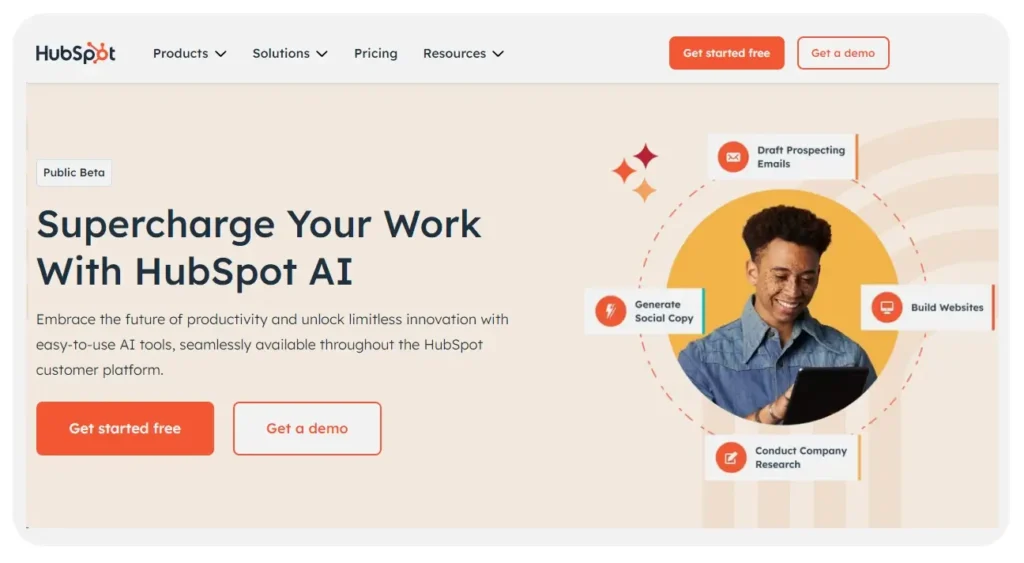
To find out more: https://www.hubspot.com/products/artificial-intelligence
Mailchimp
The most popular email marketing and sales platform, bought by Intuit, now has artificial intelligence features that help users create more effective email campaigns. The platform uses AI to suggest email subject lines, predict the best time to send and recommend design and content improvements. In addition, Mailchimp offers predictive segmentation and behavior-based automation, allowing campaigns to be highly personalized and targeted.
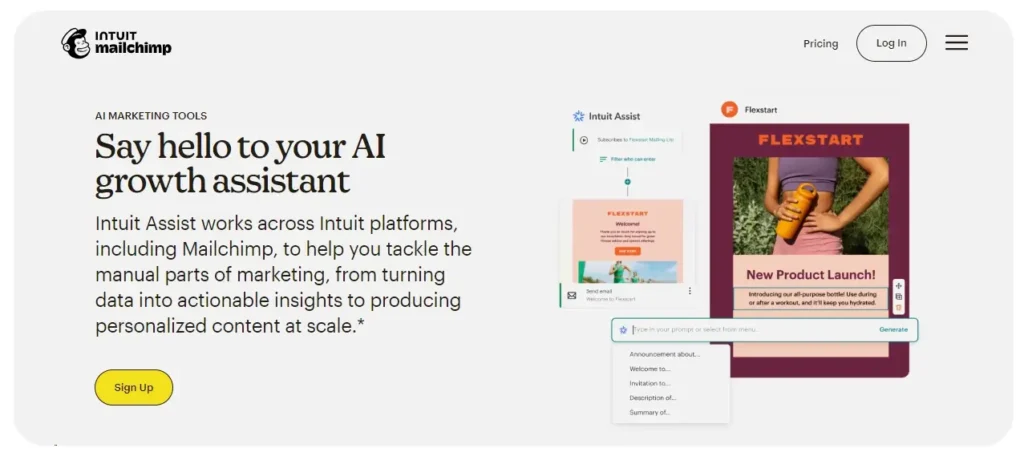
To find out more: https://mailchimp.com/solutions/ai-tools/
GetResponse
GetResponse has integrated artificial intelligence to improve marketing automation and email segmentation, seeking to predict user behavior and allowing more targeted messages to be sent at the right time.
Other features include automated A/B testing and an editor for creating AI-assisted landing pages.
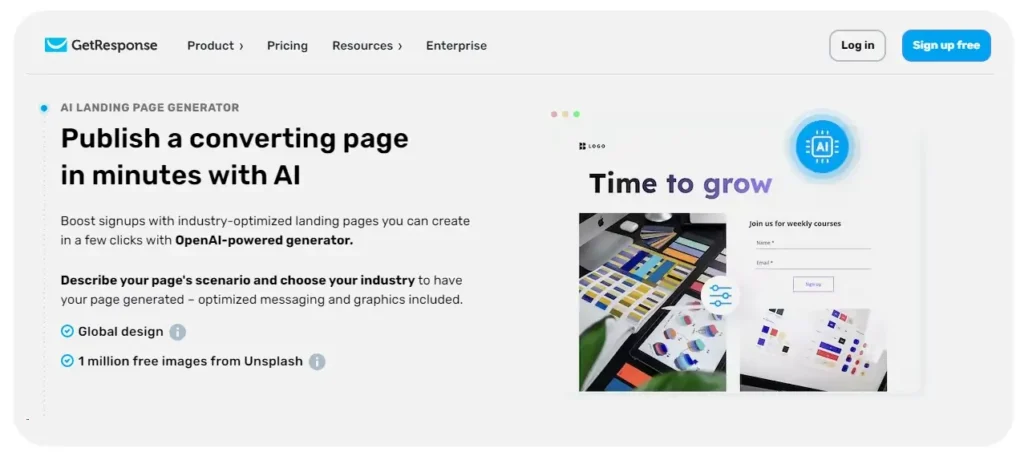
To find out more: https://www.getresponse.com/features/landing-page-creator
Mailmodo
Mailmodo is an email marketing platform which, to date, has presented the most features based on artificial intelligence, with the creation of actionable emails using AMP technology, allowing, for example, forms and questionnaires to be filled in directly in the email message.
It also allows for the personalization and optimization of campaigns, the creation of content and layouts based on AI.
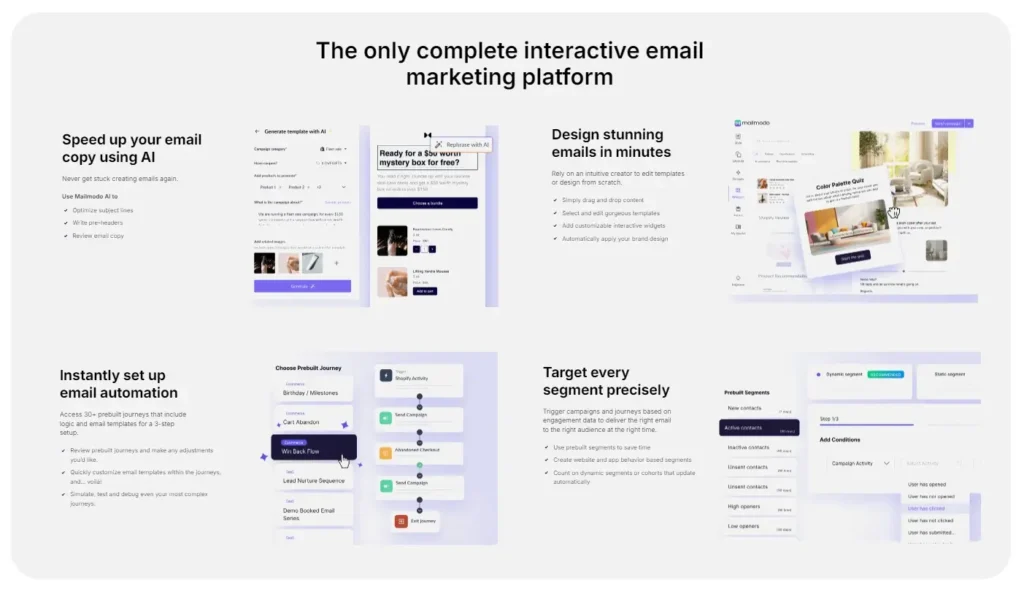
To find out more: https://www.mailmodo.com/
AI platforms with Email Marketing features
And now, let’s talk about some platforms focused on artificial intelligence (or other activities that add value to digital marketing) that have features that enhance email marketing actions.
ChatGPT (Open AI)
Perhaps the most popular AI tool, it makes it possible, through prompts, to create email content, generate ideas for campaigns, personalize messages, and even automate responses to common customer queries, including images.
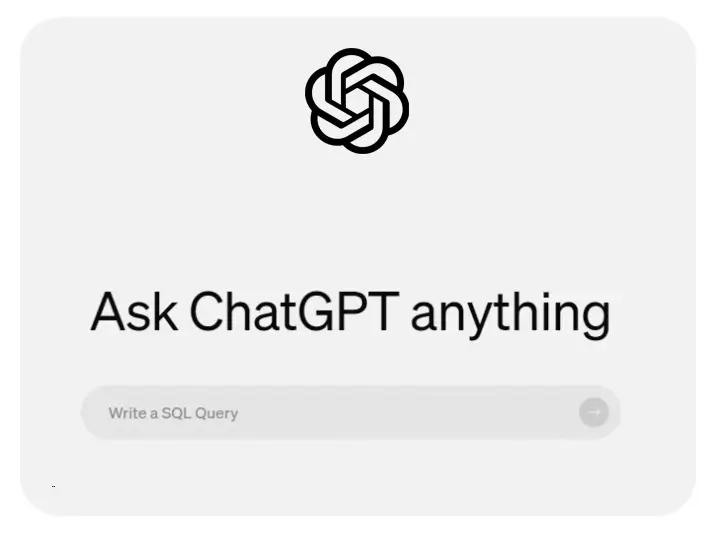
To access: https://openai.com/
Jacquard (former Phrasee)
Generation of optimized subject lines, email texts and CTAs to increase engagement. Uses machine learning models to create content that resonates better with the target audience.
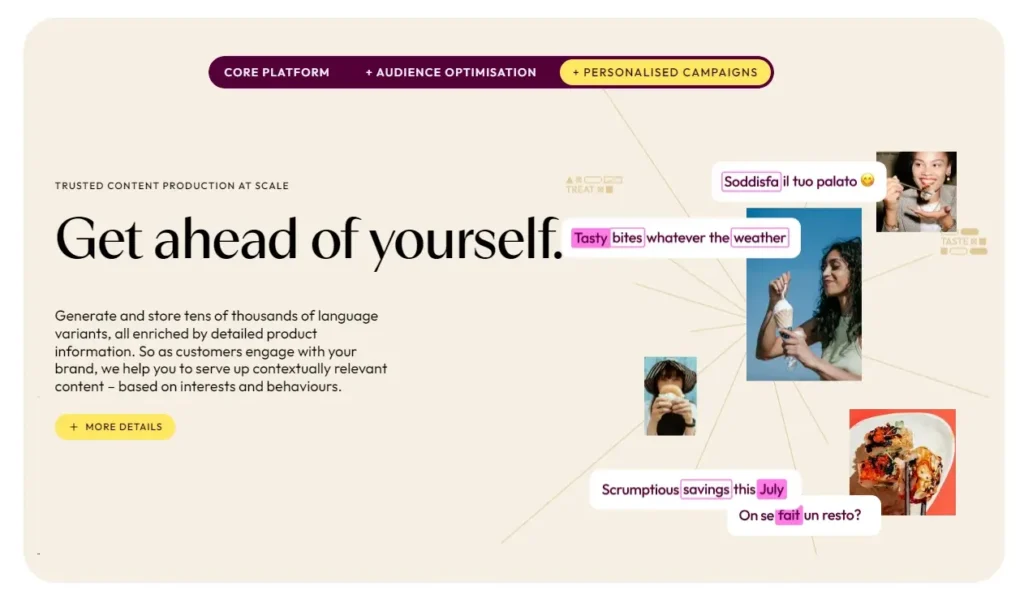
To access: https://www.jacquard.com/
Lavender
AI tool that helps personalize and optimize sales and marketing emails. It offers real-time improvement suggestions for email content and helps adjust tone and structure.
Basically, it’s an email sales pipeline automation tool with AI resources that can be integrated with various platforms, such as Gmail, Outlook, HubSpot, Apollo, Salesloft, among others, as well as being added to Google Chrome.
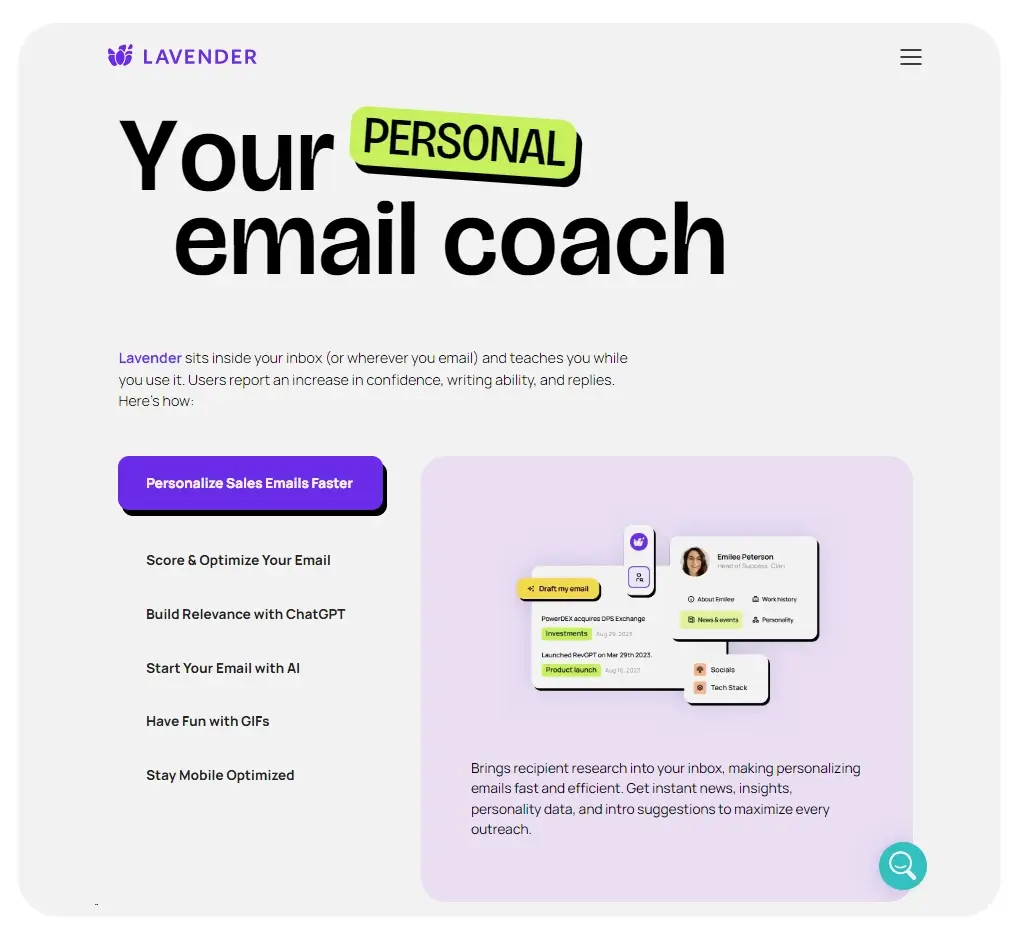
Copy.ai (content generation)
Content generation for emails, including subject lines, introductions, email body, and CTAs. It’s especially useful for creating multiple variations of content quickly.
It also promises marketing automation features, such as content creation for SEO, localization and translation of texts, creation and optimization of Ads and Product Marketing.
In its AI function for sales, it promises personalized prospecting, competitor analysis, among other features.
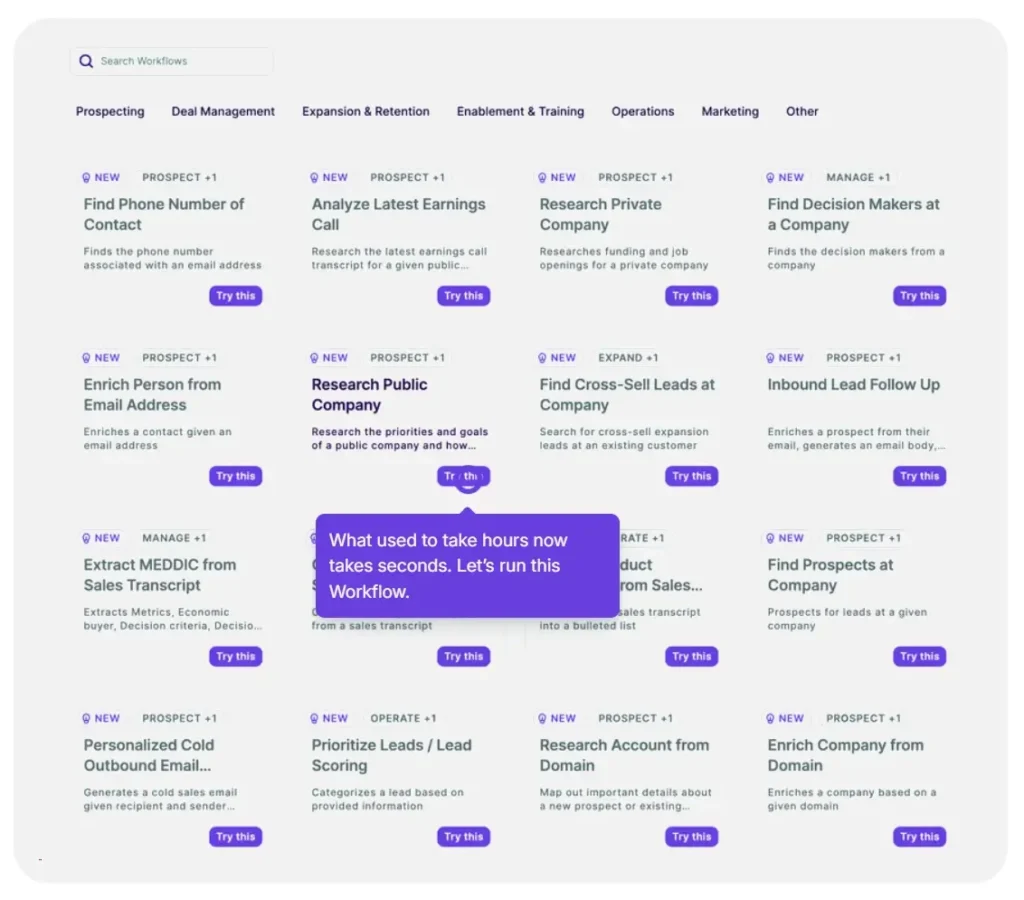
Para acessar: https://www.copy.ai/
Acrolinx
Helps ensure that email content is aligned with the brand’s voice and optimized for clarity and impact. Can analyze and suggest improvements to the content created.
Features include writing and adapting to the company’s style in eBooks, videos and much more, for marketing, products, support, inclusive language, technical communications, among others.
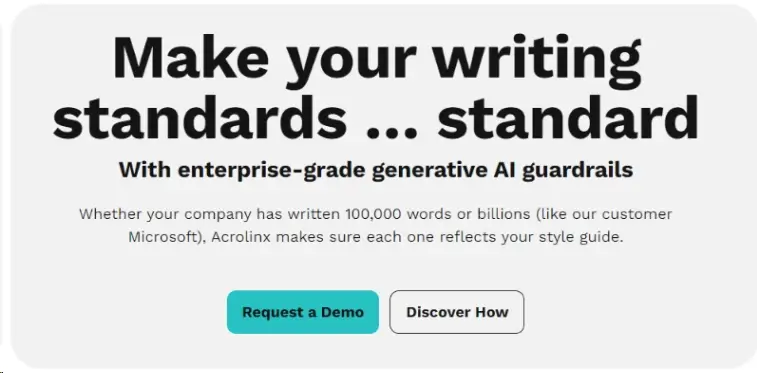
To access: https://www.acrolinx.com/
Grammarly – writing, proofreading and AI checker
It offers AI-based suggestions for improving the grammar, tone, clarity and impact of email content. It can also help adjust content for different audiences.
It has AI writing tools, a grammar checker, a plagiarism checker, an AI text detector and more.
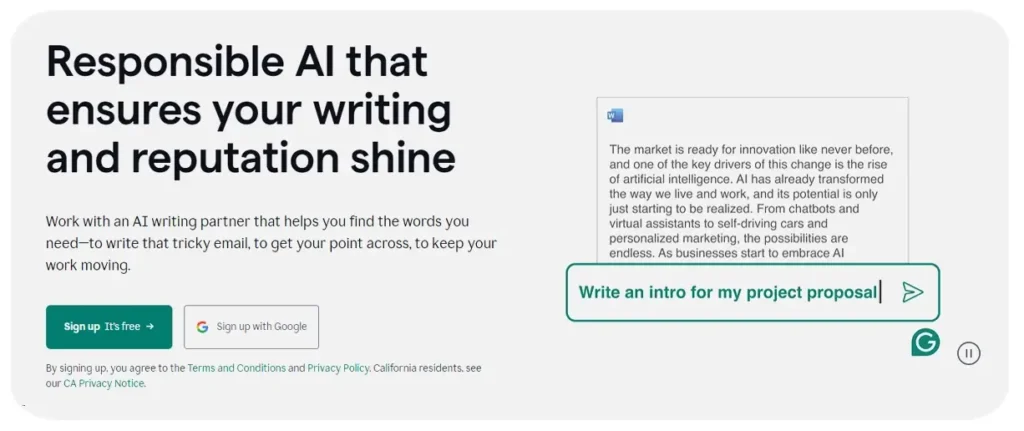
To access: https://www.grammarly.com/
Salesloft (former Drift)
Conversational marketing tool with AI that allows you to create automated email flows and respond to customer queries in real time, integrating personalization and automation.
The platform promises to help sales teams optimize and automate the process of interacting with potential and existing customers, with tools to manage sales cadences, track the performance of emails, phone calls and messages, and provide data-based analysis and insights to improve sales strategies.
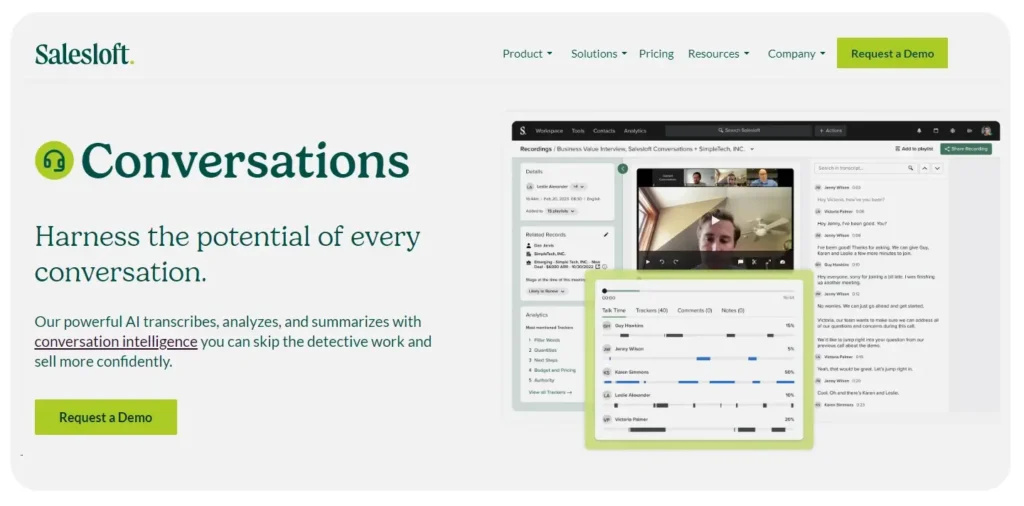
Para acessar: https://www.salesloft.com/
Zebra AI – Data analysis and generation of graphic storytelling
Zebra AI is a very interesting tool that identifies key trends and insights from your data.
Simply upload your spreadsheet and the AI will point out trends, patterns, anomalies and, based on these arguments, it will determine the ideal presentation format.
It will select the best graphics, put together the presentation and provide you with a fully customized dashboard, as well as a set of Powerpoint slides for presentations.
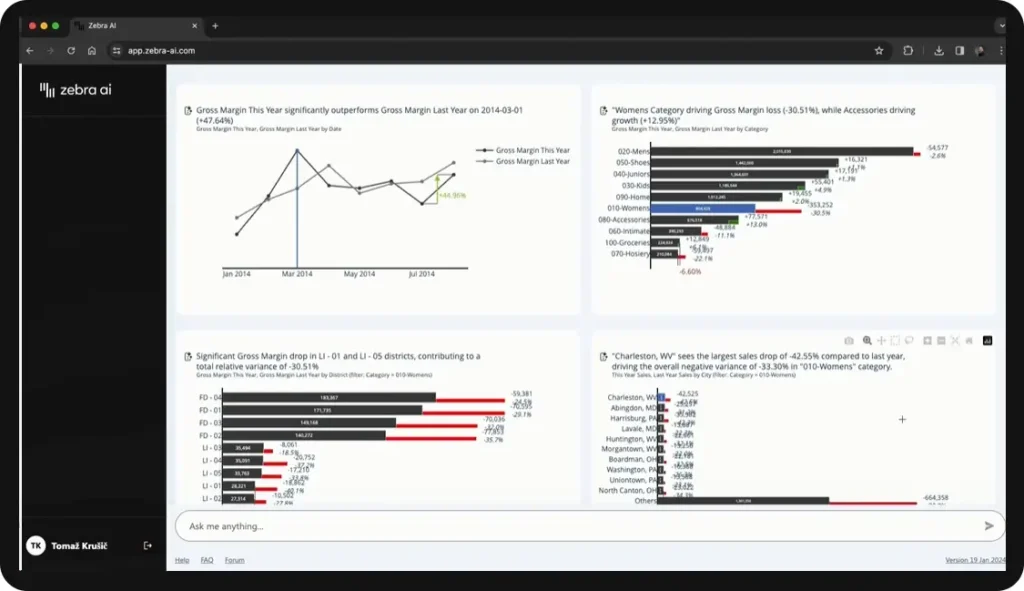
To access: https://zebra-ai.com/
Smartwriter.ai
Smartwriter is an automated cold outreach email writing tool, based on artificial intelligence, which promises up to 8 times more responses from contacts.
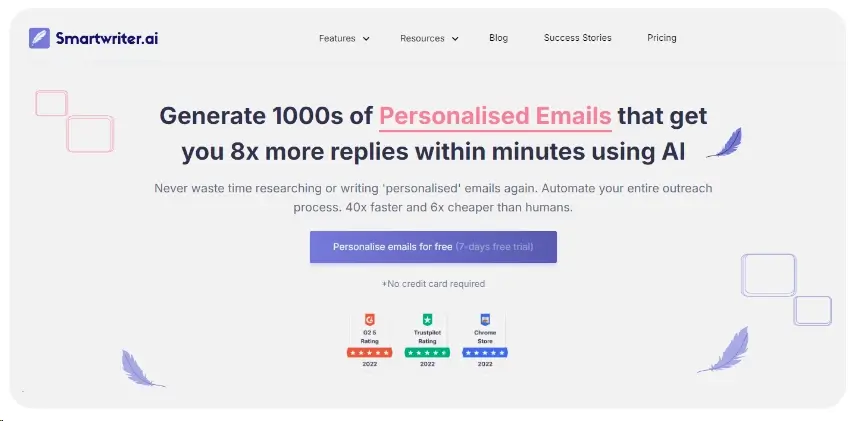
To access: https://www.smartwriter.ai/
Writesonic
Writesonic is a writing assistant for various types of content, such as blog posts, social media, product descriptions, among others, with functionalities that offer features such as content reformulation, text expansion and summarization, to optimize the content creation process.
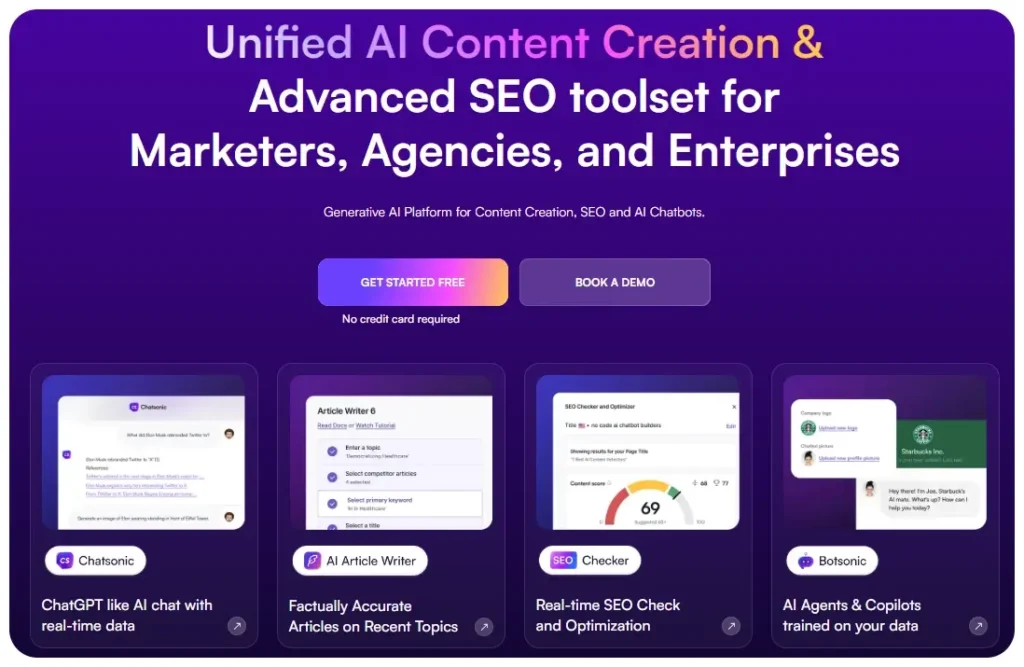
To access: https://writesonic.com/
Automating email verification
The processes of registering new leads on registration forms, landing pages, etc., can rely on real-time email verification integrations, saving companies’ marketing teams time, budget and effort, while ensuring the best possible quality of email address records.
SafetyMails has an API for real-time email verification for forms, as well as integrations for batch email list verification, making everything automated and safer for the reputation of email senders.
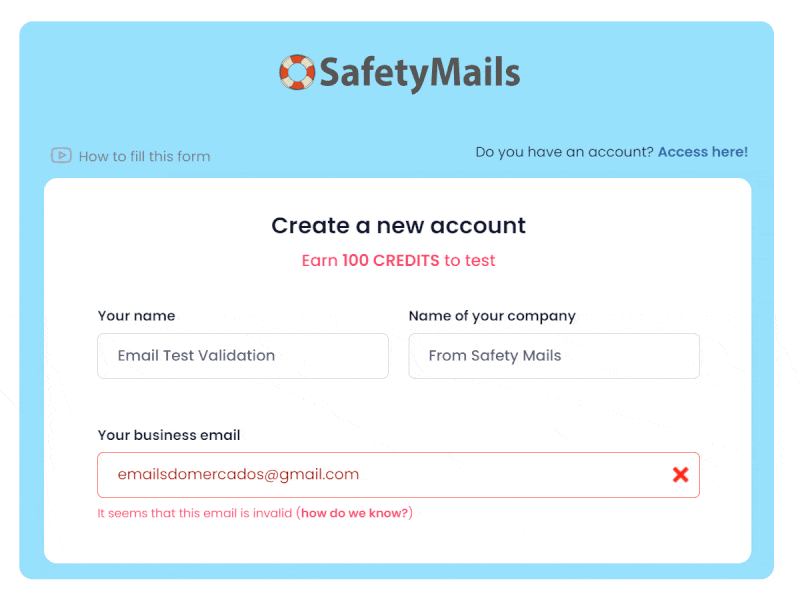
To find out more: https://www.safetymails.com/
Conclusion
The implementation and use of artificial intelligence in email marketing is not just a passing trend, but an evolution that is shaping the future of digital marketing.
As we have seen, AI offers numerous benefits for task automation, content personalization, and the ability to generate real-time insights that are very difficult and time-consuming to achieve manually.
However, like any emerging technology, AI also brings challenges, especially with regard to data privacy and the need for marketers to be constantly updated.
The ability of professionals to use these tools strategically, balancing automation with human creativity, is the secret to success in a market that is developing by leaps and bounds. The future promises new developments, but the present already demands that companies adapt their practices to make the most of the capabilities that AI offers.

FAQ
By analyzing user behaviors and preferences to create content that really suits each segment, including personalizing subject lines, email bodies and product recommendations, all in real time.
The need to comply with privacy regulations such as GDPR, LGPD and CCPA, the adaptation and training of professionals to use these new technologies, and an ethical approach to the use of consumer data.
No. It helps them perform their duties by automating tasks and offering insights, but professionals are essential for strategic planning, campaign supervision and creative innovations that AI cannot achieve alone.
By automating repetitive processes such as list segmentation and content creation, allowing professionals to focus on more strategic tasks, increasing operational efficiency and allowing campaigns to be launched faster and with greater precision.
There are countless AI tools for email marketing, but among those with AI capabilities we can mention HubSpot, Mailchimp, GetResponse, and Mailmodo, all of which offer automation, personalization, and data analysis features that help optimize email marketing campaigns.
Yes, as long as AI is used as a support tool and its suggestions are reviewed and adjusted by marketing professionals. Human supervision is essential to ensure that campaigns remain aligned with brand objectives and consumer expectations.


